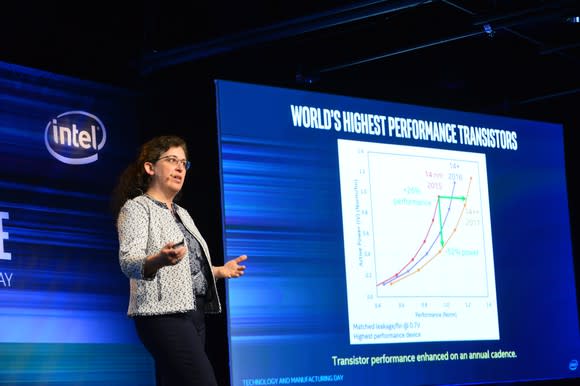TSMC Is Set to Beat Intel at Its Own Game
For many years, Intel (NASDAQ: INTC) was known as the industry leader in chip manufacturing technology. The company's chip manufacturing group employees were nothing less than superstars, consistently delivering industry-leading chip manufacturing technologies to the market well before its competitors could.
That manufacturing leadership position allowed Intel to deliver products that its competitors couldn't match at cost structures that allowed for incredible levels of profitability.

Image source: Intel.
In recent years, Intel's manufacturing leadership position began to slip, thanks to continued delays in the mass production of its upcoming 10-nanometer chip manufacturing technology.
Today, Intel not only doesn't have a manufacturing leadership position, but it's actually behind. The company's fiercest chip manufacturing rival, Taiwan Semiconductor Manufacturing Company (NYSE: TSM) recently began mass production of chips using its 7-nanometer technology (roughly equivalent to Intel's 10-nanometer technology) while Intel's 10-nanometer technology won't go into mass production until sometime in 2019 (likely late in the year).
Additionally, based on what TSMC has stated publicly (and based on Intel's refusal to speak publicly about its own plans), it doesn't look like this situation will get a lot better for Intel anytime soon.
TSMC set to stay ahead of Intel
TSMC has said that it plans to bring an enhanced version of its 7-nanometer technology, known as 7-nanometer+, into volume manufacturing sometime in 2019 (given the product cycle schedules that TSMC's biggest customers operate on, I'd bet on volume production in the first half of 2019).
Then, in 2020, TSMC has said that it plans to mass produce chips using its 5-nanometer technology, which promises a substantial chip area reduction as well as reasonable performance and power consumption improvements over its 7-nanometer and 7-nanometer+ technologies.
Given that Apple tends to be among the first adopters of TSMC's latest technologies, it's reasonable to expect that TSMC will begin mass producing chips for the iPhone that'll launch in the second half of 2020 sometime in the first half of the year.
If Intel doesn't go into mass production on its first 10-nanometer chips until sometime in late 2019, then the company will find itself in the same position that it's in now -- about a generation behind TSMC in terms of manufacturing technology.
Moreover, Intel hasn't provided much insight into when its follow-on to its 10-nanometer technology, known as 7-nanometer, is slated to go into production. The fact that Intel has been dead silent about that upcoming technology (aside from an admission on its most recent conference call that it was too aggressive with its 10-nanometer goals and is pursuing a less aggressive path for 7 nanometer) isn't inspiring, either.
At least right now, it looks like TSMC will stay ahead of Intel in terms of chip manufacturing technology for the next several years.
TSMC's competitive edge
Intel and TSMC aren't direct competitors -- Intel builds internally designed products using its manufacturing technology, while TSMC builds other companies' designs for them. The problem for Intel is that its competitors all have access to TSMC's chip manufacturing technologies.
If TSMC continues to stay clearly ahead of Intel in terms of chip manufacturing technology, then no matter how good Intel's product designs are, it'll still be operating at a manufacturing disadvantage to its competitors that rely on TSMC for chip manufacturing. That manufacturing disadvantage could translate into a product-level disadvantage, ultimately leading Intel to lose market segment share, suffer from gross profit margin erosion, or some combination of the two.
One way or another, Intel needs to find a solution to its manufacturing woes quickly, or the company's financial performance and share price could be set to deteriorate in the coming years.
More From The Motley Fool
Ashraf Eassa has no position in any of the stocks mentioned. The Motley Fool owns shares of and recommends Apple. The Motley Fool has the following options: long January 2020 $150 calls on Apple and short January 2020 $155 calls on Apple. The Motley Fool has a disclosure policy.

 Yahoo Finance
Yahoo Finance 